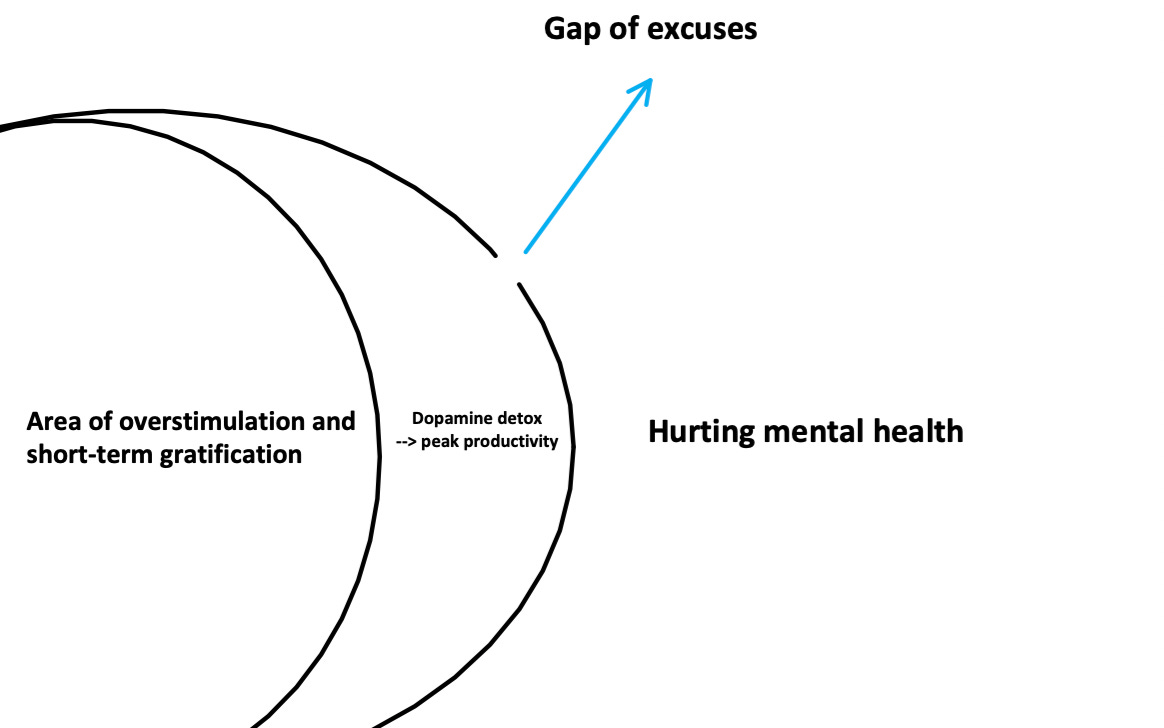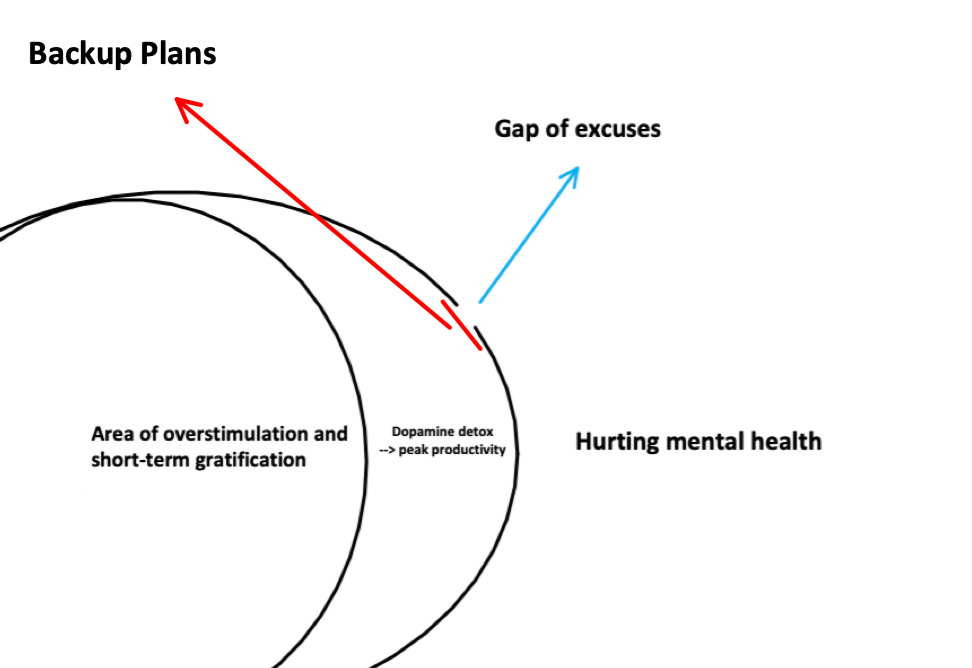TLDR;
Dopamine detoxing and regulation are good - but we need to know when to let ourselves off the hook so we don’t spiral down into poor mental health
Screw excuses by having backup plans to pivot when a certain scenario happens in pursuit of a goal/task
—
I have been a huge advocate for dopamine detoxing and its benefits for a while now. But, after 3 months of lowering and regulating my dopamine intake in my first semester of university and utterly dedicating myself to academics, I found a dangerous part of dopamine detoxing that I hadn’t before.
Peak productivity gained from dopamine detoxing is edge-to-edge in hurting mental health.
When fully dedicating ourselves to a task or goal, it is easy to be carried away by the grind. We can easily tend to keep pushing away gratification to achieve the one goal we are fixated on. Eventually, though, I am sure everyone relates, we reach burnout or a slump.
These are normal, if we didn’t have them we wouldn’t even be human. But how do we reduce their severity to ensure these slumps don’t completely break us down completely for a while?
After brainstorming and ruminating about this problem for a while, I believe I have some concrete points for solving this problem.
Set concrete goals (really): I have not hated a lot of things more than business teachers in high school telling me about SMART goals. I’ll admit for once that they are right. It’s ridiculously important to set SPECIFIC goals that aren’t too easy or too hard to meet. These also need to be set for a shorter amount of time. I set a goal in my last blog to get into an Ivey League MBA. I reflect back now and realize that is ridiculous. The goal is so far, I can’t measure my progress towards it effectively. Measuring progress is key, it motivates. If I am not too far in my progress, another source of motivation is looking back at my progress in life and using that as a pedestal. Better goal: get a 90% average for the first year, score an internship in strategy, start a project I like and build something worth $100k. Ambitious? Yes. Short-Term and Doable? Also yes.
Make a backup plan for burnout or some expected fuck-up: While pursuing my yearly goals, I always hit a slump. It happened during university application season, it happened in my gap year (quite often actually), and it happened on my trip to India the past year. I have realized I can’t just hype myself up and make myself believe that in my trajectory towards my goal I am always going to be happy and hyped up and everything is going to be fairytale-y perfect. It’s never fucking happened. It’s never going to. But, there’s a solution I have found that I need to test out but it makes a lot of sense. While listening to Episode #154 of The Knowledge Podcast, I heard that when setting our goals, if we make a scenario plan (for eg: if ___ happens while completing my Codecademy course by next month, I’ll make this ___ change to pivot and stay on the goal). In this way: we’re apparently much more likely to stay true to our goals and not abandon them. To summarize: setting goals with backup, starting small, progressing and pivoting (using a scenario plan) when needed. An example in the podcast mentioned Michael Phelps (the Olympian Swimmer). Phelps had won seven gold medals in the Olympics and was one away from winning the eighth one, which would make him the first Olympian ever to win eight gold medals in their sport. All he had to do to win the eighth medal was to win a freestyle race, easy-peasy for him because it was his niche strength really. Midway through this big race, his goggles started filling with water. This would be an end-all scenario for anyone, but - Phelps and his coach had already thought about this scenario, and they had found the solution for Phelps to count each stroke to know when he reaches the end of the pool. So, when this actually happened unexpectedly, he was prepared, he pivoted and won. He became the first person to win eight medals in Swimming. I might be iffy with some details here and there but you get the point. Now, here’s the most important part of all of it: Shane Parish pointed out that IF Phelps had lost and made the excuse his goggles had broken - EVERYONE without questioning would have accepted the excuse because it is a fair excuse. When I heard this, it was an epiphany. I realized how ABSOLUTELY EASY it is to make excuses. The solution to not making excuses - even with ourselves is having backups.
The whole thing is in today’s day mental health is prioritized and talked about so much. Don’t get me wrong, I believe it is crucial to talk about mental health issues and seek help when needed. But I also believe just because of this fact, it’s so easy to make excuses. We label being upset as an illness often when really, it’s not bad. I say this because I used to use such labels before to make an excuse for not excelling. I could do that today too - but I am not hurting anyone but myself. It is important to make backup plans and to pivot for this reason because when we have another plan when one fails, we are much more likely to use it even if the first one fails or nearly fails. Backup plans are the wall in front of the Gap of Excuses that can lead so easily to hurting mental health. Using these backup plans is important because we can bounce back from almost seeking excuses, seek some dopamine in this stage and get back to our flow state and productivity grind towards long-term goals.
Alternatively: to address if your slump may actually be a mental health issue, I think a good measure is monitoring if you stay in that state of mind for a week even upon attempts of recovering.
BEFORE:
AFTER:
I still like to stay disciplined and be hard on myself, but I believe this backup plan helps. I believe nothing is hard if we take these steps and keep reflecting on our progress. I genuinely believe people saying anything is ‘hard’ is absolutely bullshit. Labelling something as ‘hard’ is the worst thing we can do to ourselves. I like to live by keep making ambitious big goals, breaking them down for a few months, and now trying to use pivotal backups and to keep going. Linear Algebra, Calculus, Coding or Physics. Learning isn’t hard - with consistent habits and study methods. And I get to say this because I nearly failed in Math back in Grade 8, labelled myself “not a math person”, got over that and got the highest marks in my Grade 12 year in this subject I used to despise.
It’s only when we try to win a competition or anything luck inclusive that this doesn’t apply because, with achievement and competition, it’s a whole other ballgame. Probabilities come into play and that is luck - we cannot label luck as easy or hard. That’s just luck, all we can do is keep working on ourselves obsessively and taking so many damn shots that one of them just scores.
REFLECTION (I am going to start doing this weekly):
Mistakes from two weeks:
- UofT Hacks:
- Lack of Practicality of the idea
- The idea not clear to me: couldn’t build and pitch with a firing passion
- Need different people for front-end and back-end
- Fixating on an idea too quickly
- Idea not related to the theme
Bad time management:
- Parkinson’s Law: I am spending too much time on tasks I can do quickly
Internship:
- I am so intrinsically scared of getting rejected that I am not applying to so many places. This never happens to me, I don’t give a flying fuck if I get rejected from 100 places, I need to get on this shit.
Relationships:
- Parkinson’s Law: I am genuinely not even doing anything productive OR fun. I am simply wasting time too often. I need to work on this. My solution to this is to take on a lot of commitment. More is always better than less to beat Parkinson’s Law (at least for me)




